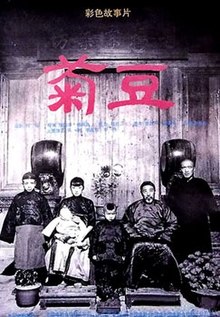|
Ju Dou
Ju Dou (Chinese: 菊豆; pinyin: Jú Dòu) is a 1990 film directed by Zhang Yimou and Yang Fengliang, starring Gong Li as the title character. The film, based on the novel Fuxi, Fuxi (伏羲伏羲) by Liu Heng,[3] is a tragedy that revolves around Ju Dou, a beautiful young woman sold as a wife to Jinshan, an elderly cloth dyer. The film was produced using the vivid Technicolor process, long after it had been abandoned in the United States.[4][5] It became the first Chinese film to be nominated for an Academy Award for Best Foreign Language Film.[6][7] Upon its release, Ju Dou faced a ban in China,[8] which was eventually lifted in July 1992.[9] PlotJu Dou is set in the early 20th century in rural China. Yang Tianqing (Li Baotian) returns from a journey to sell silk for his adoptive uncle, Yang Jinshan (Li Wei). Jinshan, a fabric dyer, is notorious for his cruelty. Upon Tianqing's return, another worker is fired by Jinshan. This worker informs Tianqing that Jinshan has recently acquired a new wife, having previously beaten his two wives to death when they failed to bear him a son. Ironically, Jinshan is impotent. When Tianqing meets the new wife, Ju Dou (Gong Li), he becomes infatuated with her. At night, Jinshan subjects Ju Dou to torture. Tianqing discovers Ju Dou's bathing area and secretly observes her. Unbeknownst to him, Ju Dou is aware of his presence. Initially, Tianqing voyeuristically watches, but Ju Dou transforms his gaze by revealing her bruises and weeping, compelling him to see her as a human being rather than just a sexual object.[10] Eventually, their passion becomes uncontrollable, and Tianqing and Ju Dou engage in a sexual relationship. When Ju Dou discovers she is pregnant with Tianqing's child, she and Tianqing deceive Jinshan by pretending the child is his. Jinshan suffers a stroke that leaves him paralyzed from the waist down. After Ju Dou confesses the truth to him, Jinshan attempts to kill the child and set the house on fire. Tianqing restrains Jinshan by suspending him in a barrel, rendering him a powerless witness to their usurpation. Aware that society would never accept her infidelity, Ju Dou seeks an abortion at a nunnery. Jinshan continues to exert influence over the child, Tianbai, whom he named, and when the child addresses Jinshan as "Father," Jinshan interprets it as psychological revenge against his wife and nephew. One day, Jinshan falls into a dye vat and drowns, leading to his funeral. Seven years later, Ju Dou and Tianqing still operate the dye mill, but Tianbai (Zheng Ji'an) has become an angry teenager. Rumors of his parents' infidelity drive him to nearly kill a local gossipmonger. In a fit of rage, Ju Dou reveals the truth about his parentage to Tianbai. Overwhelmed, she and Tianqing decide to have one final encounter but succumb to exhaustion and fall asleep in a cellar with limited air supply. Upon discovering his parents in a weakened state in the cellar, Tianbai drags them out and drowns Tianqing. Ju Dou, in turn, sets fire to the mill as the film concludes. AdaptationIn the original novel, Tianqing is Jinshan's biological nephew, and the story revolves around a taboo relationship based on affinity. However, the creators of the film adaptation chose to exclude the incestuous element. In the film, Tianqing and Jinshan are portrayed as unrelated by blood, and Ju Dou initiates her relationship with Tianqing only after discovering their non-biological connection.[11] Cast
Release and receptionJu Dou was released by Miramax Films in March 1991.[1] Critical responseJu Dou has an approval rating of 100% on review aggregator website Rotten Tomatoes, based on 20 reviews, and an average rating of 8.3/10.[12] Awards
Accolades
Home mediaJu Dou was initially released on DVD in the United States as an all-region disc on the Pioneer label, Geneon Entertainment, on June 29, 1999. The disc included English subtitles.[17] The film was re-released by Razor Digital Entertainment on February 14, 2006 as part of the new Zhang Yimou collection to capitalize on Zhang's recent international successes of Hero and House of Flying Daggers. The new edition was Region 1 and included English, simplified Chinese, and traditional Chinese subtitles. Despite the DVD box stating that the film is presented in widescreen, it is actually presented in full frame.[18] See also
ReferencesFootnotes
Sources
External links
|
||||||||||||||||||||||||
